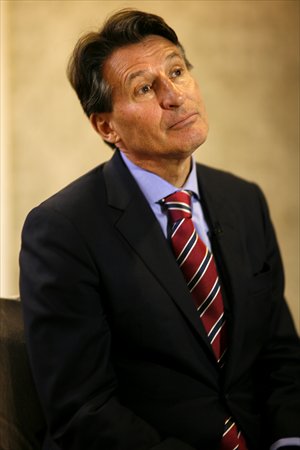HOME >> SPORTS
Coe vows to lead athletics out of abyss
Source:Reuters Published: 2015-12-4 5:03:02
Failures have been made, but IAAF boss determined to fix them

IAAF chief Sebastian Coe is addressing a news conference on October 5 in New Delhi, India. Photo: CFP
IAAF (International Association of Athletics Federations) President Sebastian Coe said Wednesday he was the right person to clean up athletics and make it responsible and accountable in the wake of a doping crisis that has embroiled track and field.The head of athletics' world governing body, who was quizzed about doping by Britain's Parliament's Culture, Media and Sport select committee, said failures had been made but he would fix them.
"I have the experience to do that and I have the support of the sport. Have there been failures? Yes. Will I fix them? Yes," Coe, himself a middle-distance Olympic gold medalist, said when asked if he could lead athletics out of the mire.
"If I don't do that I know there will be no tomorrows in our sport. I want a responsible and accountable sport. I want a sport people can trust," said Coe, a former member of Parliament and now a member of the upper chamber, the House of Lords.
Doping crisis
Athletics was plunged into crisis last month over a report by the independent commission of the World Anti-Doping Agency (WADA) detailed systematic, state-sponsored doping and related corruption in Russia.
The IAAF has since voted overwhelmingly to suspend Russia from the sport - potentially casting one of track and field's most successful nations out of next year's Rio Olympic Games.
The IAAF itself has also been beset by corruption allegations regarding the taking of bribes to cover up doping. The retired Lamine Diack, who Coe succeeded as president, was last month placed under formal investigation by French authorities on suspicion of corruption and money laundering.
The 82-year-old Senegalese is alleged to have received more than 1 million euros ($1.06 million) in bribes in 2011 to cover up positive doping tests of Russian athletes. Diack's family has dismissed what they called the "excessive and insignificant accusations."
Coe has steadfastly denied that the governing body of athletics had been complacent in its handling of doping cases and rebuffed criticism that he, as Diack's deputy since 2007, must have known the extent of the problems in the sport.
"My vice-presidency role is non-executive. It was about 10 days a year. We have a clear separation between anti-doping and non-executive committee," he said. "I was aware that we had a problem but not the specific numbers.
"If you're asking specifically about names and numbers, I would not have known that."
London Olympic Games
Coe was widely criticized for describing German broadcaster ARD and Sunday Times' August allegations that the IAAF had ignored widespread blood-doping as a "declaration of war on our sport."
Journalists had obtained a database of athletes' blood tests over an 11-year period and concluded, after an examination by two experts, that it contained hundreds of suspicious results that the IAAF should have acted on.
The committee called Coe to appear as it explores the allegations.
Coe, who last week stepped down from his ambassadorial role with Nike after facing repeated questions about a potential conflict of interest, said he stuck with the sentiment but could have chosen his words differently.
"It probably expressed my frustration and anger at the time," said Coe. "I was being contacted by clean athletes and coaches at how they were having their reputations imperiled.
"The issue I took exception to was very selective use of data that could not be used to prove positive tests. Just putting data out into the public domain as raw data is not good for clean athletes."
Coe, 59, had a glorious career on the track and then a varied one off it. As being a politician, he is a hugely successful businessman and headed the bid for and delivery of the 2012 Olympic Games in London.
Asked if there is an acceptance within the IAAF that doping was tolerable, Coe dismissed that accusation.
"If I go back to the immediate challenge we have there is Russia's ban and allegations made about some people in the IAAF," he said.
"If you say IAAF has acceptance that doping is acceptable, I don't accept that."
Posted in: Feature, Miscellany